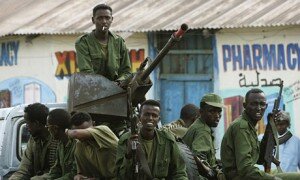 A new offensive against Islamist militias is a sign of hope for Somalia’s fragile western-backed government.
A new offensive against Islamist militias is a sign of hope for Somalia’s fragile western-backed government.
Long-suffering residents of Mogadishu are steeling themselves for a new round of fighting as the western-backed transitional federal government (TFG) prepares to launch an offensive to expel Islamist militiamen from the Somali capital. Yet grim though the prospect is of renewed violence, the looming attack is a sign the tide may be turning in Somalia: the “good guys” are fighting back.
Speaking in London on Tuesday, Sheikh Sharif Ahmed, Somalia’s president, declined to detail his plans to wrest control from the hardline al-Shabaab militia, which currently holds most of the city. Asked about reports that the US military may provide air cover during the forthcoming offensive, he said he would welcome any support the Americans and British chose to offer.
Britain says it gives no direct military or security-related financial assistance. But it does provide “advice and support” on security force development, via a joint security committee, and help with training TFG forces and African Union peacekeepers. The US does much the same. London donated £11.5m in humanitarian aid in 2009-10, much of it delivered via Unicef and NGOs. Significant additional funding will be announced this week.
The new cash, and the red-carpet treatment afforded Sharif during his London visit (including a Downing Street meeting with Gordon Brown), reflect cautiously rising hopes in Whitehall and Washington that the former Islamic Courts Union leader, who opposed the US-backed Ethiopian intervention in 2006 and was viewed as hostile to the west, could be the man to drag Somalia back from the brink.
Unlike numerous predecessors who vied for power following the collapse of Somalia’s central government 19 years ago, Sharif’s presidency rests on his election by Somalia’s parliament-in-exile in Djibouti last year. Diplomats say this gives him unusual legitimacy and authority among Somalia’s notoriously fractious clans, although deep divisions persist.
Sharif has won praise from western governments and the African Union for his attempts to create viable institutions and financial accountability. One notable move was the hiring of accountants PricewaterhouseCoopers to track donor funds. “They (the TFG) are working hard in re-establishing state institutions … they are making progress, working some specific budgets for the first time,” said Wafula Wamunyinyi of the AU commission for Somalia.
Given Somalia’s treatment as a virtual free-fire zoneby both George Bushes, Sharif’s remarkable post-election declaration that “America has become a force (for) peace” in Somalia has also shaped favourable western attitudes. Unsurprisingly, his Islamist foes were disgusted at an apparent sell-out to the unbelievers. “We shall fight the so-called government of Sharif in every place,” said an al-Shabaab leader, Sheikh Hayakalah.
Al-Shabaab is making more threatening noises now. “They typically repeat offensive words. Why don’t they attack us?” said spokesman Sheikh Ali Mohammad Rage. “America can do nothing to us. It will face something worse than in 1992″ (when US troops died in the infamous “Black Hawk Down” skirmish with Islamist fighters).
For his part, Sharif stresses reconciliation with any enemies ready to lay down arms. He is expected to sign a peace pact with one group, Ahlu Sunna Waljamaca, on his return from Europe. That leaves Sheikh Dahir Aweys, a former Islamic Courts Union co-leader, who now heads the hardline Hizbul Islam group, and the al-Qaida-affiliated al-Shabaab still opposing political dialogue. “We are open to talks with all Somalis,” Sharif said Tuesday.
The obstacles to Sharif succeeding in reuniting his country remain daunting. The humanitarian situation is the world’s worst by some estimates, with half the population dependent on aid. Al-Shabaab still controls most of central and southern Somalia and has banned access to the World Food Programme. Aid workers face lethal hazards; many have died or been kidnapped. Not all of the over $200m pledged by donors last year has materialised, and in any case, much more is needed.
Radicalisation of young Somalis, both in the country and in the diaspora, notably in Britain, the US and Australia, remains a problem. Piracy appears beyond the power of the TFG to suppress. There is also little it can do to curb malicious meddling in its affairs by regional countries such as Eritrea.
Sitting calmly in a London hotel, Sharif insists “significant progress” has been made and that Somalia is on the road to recovery. On that claim, the jury is out, at home and abroad. “A lot of Somalis are still waverers, sitting on the fence to see which way things go,” a regionally based observer said. “Sharif has a lot of legitimacy and the opposition has made itself seriously unpopular. But he has to deliver more, more quickly. People won’t wait forever.”
Simon Tisdall
guardian.co.uk,
Article history



